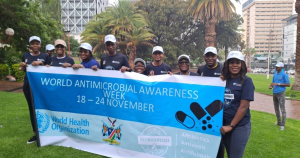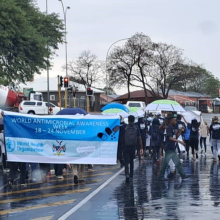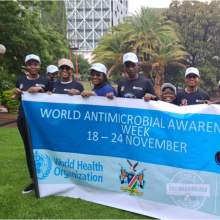Namibia Commemorates the 2023 World Antimicrobial Resistance Awareness Week
Imagine a world where medical treatment of routine ailments or operations become life-threatening and stop responding to drugs. The seemly far-fetched scenario is becoming real and a danger to medical interventions with the emergence of antimicrobial resistance (AMR).
The emergence and spread of antimicrobial resistance – where micro-organisms such as bacteria, viruses, fungi, and parasites are resistant to antimicrobial treatment – is complicating the management of many infectious diseases, and endangers animal health and welfare, and food production, safety, and security.
This year, Namibia joined the international community to observe the World AMR Awareness Week from 18 to 24 November and raise awareness of the risks posed by the inappropriate use of antimicrobial medicines in humans, animals, and crops and encourage their responsible use to reduce the emergence and spread of AMR.
WHO in partnership with Ministry of Health and Social Services, the Ministry of Agriculture, Water and Land Reform (MAWLR), and the Ministry of Environment, Forestry and Tourism (MEFT) actively engaged the public through different awareness campaigns including radio and television talks and community sensitization meetings. This cemented this year’s theme, “Preventing Antimicrobial Resistance Together,” calling for multisectoral action in the context of the One Health approach
The highlight of the week’s long activities was a march where 200 AMR awareness champions from various institutions walked through Windhoek’s Independence Avenue emphasizing the urgency to preserve the efficacy of antimicrobial medicines. At this event, the Deputy Executive Director of MoHSS, Mrs. Petronella Masabane, highlighted the need for community engagements to create AMR awareness.
WHO’s Aina Erastus, emphasized the disastrous effects of antimicrobial resistance (AMR), which led to 1.27 million deaths worldwide in 2019—more than HIV/AIDS and malaria combined—as well as the fact that Sub-Saharan African countries bore the greatest burden of AMR-associated death rates, with 99 deaths per 100,000 people during her remarks. She further called on countries to improve AMR governance and leadership, and to provide "further financial and technical support for countries to develop, prioritize, implement, and monitor their NAPs." She further urged leaders and communities from diverse sectors to take immediate coordinated action to preserve antimicrobials and safeguard the environment, people, animals, and plants.
World Antimicrobial Awareness Week (WAAW) aims to encourage best practices among the public, health workers, farmers, animal health professionals and policy makers to prevent further emergence and spread of drug-resistant infections in people and animals.
The week also marks two years since a unique partnership of six regional organizations was formed to push ahead on fighting AMR in Africa, involving the Tripartite Partners (the Food and Agriculture Organization of the United Nations (FAO), the World Organisation for Animal Health (OIE), and the World Health Organization (WHO), with the UN Environment Programme (UNEP) , the Africa Centres for Disease Control and Prevention (Africa CDC), and the African Union Inter-African Bureau for Animal Resources (AU-IBAR).



